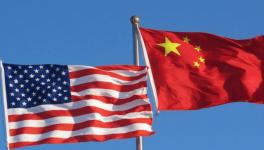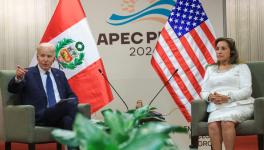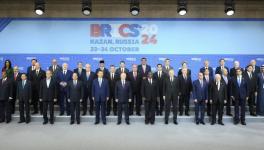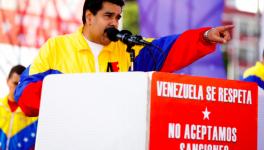Trump’s Week: Fast and Spurious
Prabir Purkayastha talks to Professor Vijay Prasad about Trump’s victory and his official entry in the Oval Office. In his first week, he has already taken some decisions. He has announced withdrawal from Trans-Pacific Partnership. The webpage on the Trans- Atlantic Partnership, which was a trade agreement with the European Union, has also disappeared from the White-house website.
He had campaigned this issue strategically in the states where there is an antipathy to trade agreements, because in some of the states it is a belief that people have lost their jobs because of the trade agreements. This was also one of the factor which swung the elections towards his side.
Is the TPP really about trade or is it about geo-politics? Or is the main issue here the isolation of China. This exit from the trade agreements, is not an exit from globalisation.
While Trump’s rhetoric on China is quite dramatic, he is relatively much softer on Russia, and one needs to wait and see whether he is trying to bring Russia on side and isolate China.
Rough Transcript:
Prabir Purkayastha: Hello, and welcome to Newsclick. Today we have with us Prof. Vijay Prashad, and we will be discussing Trump’s victory and assumption of office in the US.
Vijay Prashad: Nice to be here, Thanks.
Prabir: Vijay, Trump has taken over office in the United States, while there’s been a lot of controversy regarding the size of his inauguration crowd and so on, but he seems to have also taken certain other measures which do not seem to have registered in the media so well. One of it is Trans-Pacific Partnership, the TPP. So how do you see Trump’s withdrawal from TPP, which he has announced and how do you see its long term play in the global scenario?
Vijay: It’s true that he has pulled out of the Trans-Pacific Partnership: the 12 country alliance, trade alliance that was being negotiated, largely in secret. He decided to walk away from this thing, it hurts American workers. At the same time as he pledge to re-negotiate the North American Free Trade Agreement. But by the way, also and less well reported, from the White House website, the webpage on the Trans-Atlantic Partnership, which was the kind of trade agreement with the European Union, has also disappeared. Now, its interesting why has the trump administration decided to go after these particular trade agreements? One reason is that, this is exactly the issue that he campaigned on. And he campaigned on this very strategically, because in the contentious states of Ohio, Pennsylvania, Michigan where the great old American working class used to exist, you know sections of these states have become the rust belt, here there’s a great antipathy to trade agreements. There is a belief that it’s a result of trade agreements that they have lost their jobs. Trump won these parts of United States and this is what swung the elections to his side. It was impossible for him not to do something. But what has he really done? In other words, are these agreements; is the Trans-Pacific Partnership really about trade? Or is it about geo-politics? It’s my sense that this really not going to impact the question of trade by itself. In other words, the United States has bilateral agreements with most of these countries. Trade in this circuit is largely liberalised. Of course there are some issues of agricultural subsidies in Japan, perhaps, so called point of origin certificates on auto mobiles imported from Japan to the United States; there are some issues that have not been resolved in the hope that the TPP would be the forum to resolve this. But really this is not a trade pact. The main issue here is the isolation of China. In fact, in 2015 Barack Obama in a press conference directly said, you know, we need to have the Trans-Pacific Partnership because we cannot allow countries like China to write the trade rules. In the same way, the Trans-Atlantic Partnership which was the hallmark of the deal between Germany and the United States, in November of last year, Barack Obama and Angela Merkel wrote an op-ed together in the German press, saying that the values of the United States and Germany should be at the core of European-American trade agreements. In other words, Greece, Russia, these countries should not be able to influence the trade agreements. So, what I am just suggesting is that this push back against the TPP was on the one side a sop to the very important base that helped Trump get elected. But really, this was never about trade. These were always about geo-politics.
Prabir: You’ve talked about the geo-politics of this TPP and other issues. Now, it seems that there is a move in the United States which would like the Russia and China coming together to break, effectively detach Russia from China. Unlike what Obama and Hillary Clinton’s policies had done, one using Ukraine against Russia and using South China Sea against China, had really brought them together. Do you see this playing out and trump taking different position on this?
Vijay: Of course, it’s early days, Prabir, it’s hard to say definitively whether it’s one way or the other. But if we except the view that Trump has a sort of lighter, softer touch regarding Russia, then you might surmise that he has taken a position, you know, he tried to bring Russia on side and isolate China. Because his rhetoric on china is quite dramatic. Henry Kissinger, of course, has the other approach which is join up with China to isolate Russia. Kissinger’s view is that China at least is economically dynamic. It’s essential to American economy and Russia is the real threat. But then again, Kissinger is an old cold warrior and Russia was always the enemy, which is why he made the opening to China in the early 1970s. But he takes that view. I think Trump, generally the tendency seems to be is moving in the other direction: to soften relations with Moscow in order to put the screws on Beijing. So, I don’t know it’s early days, as I said it’s hard to say whether it’s going to, you know as Mao said is going to hit out in all directions or he is going to be strategic in going after one rival and then perhaps later another. By the way, I think that this kind of more strategic and lighter touch might have worked with when commodity prices collapsed and there was a real crisis in the economy of Russia and China, enduring crisis. But I think what the Obama and Clinton strategy did in the encirclement of all of Eurasia are to really integrate the strategic understanding of Chinese and the Russians. You know, along that great Silk Road project that the Chinese have, the Russians havenow made some very considerable investments. And the Russians understand now, I think, that the Chinese are perhaps better customers for their natural gas than the Europeans. And I think that this is a significant different context. In other words, the integration between Russia and China: strategically, diplomatically, economically, and militarily, has gone down the road quite considerably. And I doubt now, whether there is a same atmosphere of suspicion as there was say during the Sino-Soviet split in the 1950s.
Prabir: Vijay, the Indian foreign policy has become very difficult to predict. It seems to be entirely predicated on Mr Modi, the prime minister’s wish of the day. And how and who has reacted to him and in what way! So if you leave that out, we don’t seem to see any consistency in Indian foreign policy at the moment. When you come to the Chinese-American mix, we see a very strange scenario where the United States is now trying to articulate protectionist policies while China is following relatively aggressive move into everybody’s economic policies. And has been in fact the articulator of globalisation, as we saw in Davos. Now, given that, there is this fear that the Chinese are too big and economically too powerful, and therefore, South-East Asia and East Asia will fall into the Chinese sway if Americans don’t act as an counter balance to TPP etc. do you see that as something that might really play out? And do you see that it’s ironic that we seem to see a reversal from the opium war, when the China was being asked to open its economy by the so-called globalisers even to opium?
Vijay: Well look, I think that Trump on this is more rhetoric than anything. There was a very sober study done a few years ago that showed that since 1979, the haemorrhaging of jobs in United States cannot be put at the door of trade agreements. It said that only about 12% jobs were lost because of trade agreements. But 88% of American jobs, it suggested, were lost because of mechanisation or other productivity gains. So, you know, mechanisation is really the issue here, and that doesn’t mean one says we are against mechanisation. One might ask the question why should mechanisation, the productivity share, the wealth be distributed upwards and not socially amongst people? In other words, it’s a good thing to have mechanisation. Let’s now move to a 4 hour day! Why should people work 8, 10, 12 hours? Let’s work for 4 hours. Let’s share the working time with other people and let’s have much greater leisure. Let’s read newspapers. In other words, there could be a progressive socialist way to understand mechanisation for the betterment of human kind. But of course, this is not even something on the table, Prabir, nobody’s discussing the real reason why there’s been a haemorrhaging of jobs. It’s not on the agenda. It’s essentially irrational politics to blame China or Mexico for the haemorrhaging of jobs. Or what Trump calls American carnage, is actually beside the point. Rather than talking about what’s taking your jobs away, you are talking about this. In other words, what I am trying to get at is there cannot be a return to protectionism. The American economy is fundamentally integrated to economic activity around the world. I don’t just mean financial integration. I mean, from the, you know, very smallest thing. There will be a paralysis in the consumer market. If you think, what Modi did to India with demonetisation is insane. It was almost like a bond villain’s plot against the Indian economy. If you think that was insane. The idea that you could suddenly erect trade barriers around United States, 45% trade barrier, and it’s not going to completely paralyse Walmart, therefore, paralysing basically the working poor’s ability to get consumer goods. I mean, you’d have to be crazy to come up with that plan. So, Trump’s rhetoric about 45% this, that, and the other, none of his advisors are going to go with it. Let me just put one thing to you. He exited TPP, fine. But there are 500 American trade advisors. You know, if you ever go to a trade meeting with the American delegation, it’s like lawyers at a court room; 50 of them show up with briefcases, heavily armed as it were with the documents. You have to remember that at the WTO, the World Trade organisation, if the United States had a case against say Mali or Senegal, Senegal barely has representation there. The Americans come with a raft, so 500 of these so-called trade advisors they are all bought and paid corporate people. Not one of them has been fired. You know, when Trump came in he basically, fired all U.S. ambassadors. But he has not fired the trade advisors. So, let’s not take seriously on the surface this exit from TPP as an exit from globalisation. This is as I said is a sop to this base, this strategic base that got him elected. His commitment to globalisation is quite fundamental in the structure of the administration and when they do re-negotiate NAFTA you are not going to have unemployed, you know, steel workers at the table. You are going to again have corporate executives’ proxies sitting there negotiating rules that they like. I think, in a sense, the madness of demonetisation in India is not going to be repeated in the United States with massive trade barriers. I really do feel that this much more rhetoric than reality or than policy.
Prabir: So do you agree with Jack Ma’s argument that the basic problem with the U.S. is the trade wars…not, not trade but the physical war that it has conducted and spent 14 trillion dollars on?
Vijay: Well, I wouldn’t that’s the problem. I think that’s one problem. Of course, another problem is that the American wealthy have been on tax strike for about 40 years. You know, during the Reagan administration tax rates started to decline for the very wealthy. And the very wealthy really no longer pay taxes anymore and it’s perfectly acceptable. In fact, at the hearing of Mr Mnuchin, who’s the Secretary of Treasury, he was asked about how his firm has basically shell companies sitting in the Caribbean and operating. And he was asked directly, isn’t this a tax shelter? And he said, no it’s just a way to do business. You know, it’s perfectly acceptable for the Secretary of Treasury’s company to have tax shelters. So, the rich basically has been on strike. They’ve just refused to pay tax. Once you have that situation, you basically dry up the exchequer. So, whatever the treasury is able to collect in the way of taxes if more than half of that is spent on war you are going to obviously damage the capacity of state to produce any kind of policies that are meaningful for people. So, it’s a combination of essentially this political strike that the rich have been involved in, the wars that the country has conducted, and as I said the general dynamic of Capitalism which just substitutes humans for machines. You put all this together, you are going to get immense inequality, hence, you had the Wall Street movement- the rhetoric of the 1% against the 99%. That was a very powerful vocabulary. But there was no left force in United States able to pick that up and carry it. What you got instead, is that you got this kind of a ventriloquist of the occupy language of the Donald Trump. Donald Trump was essentially, the ventriloquist dummy of sometimes “left rhetoric”, but really he is a man of fundamentally the Right.
Prabir: There are other set of issues of really, what’s happening in the United States? There was a huge protest led by women, and fortunately this time not on the slogan that ‘Russia has stolen our elections’. They seem to have really focussed on Trump and his policies and identified that as a problem. Second, is of course, also the kind of steps he is taking- he already seems to be moving in on abortion, you talked about the pipelines that he has assigned. So, internally, he seems to which is extremely, shall we say, whatever the American liberal left sections have won over the last fifty-sixty years;and on much more aggressive internal, shall we say, capitalist project.
Vijay: Well, in the United States the culture wars, there is the wars over how one should live one’s life? What family should look like? What it means to have control over you privacy, your bodies? The way you, basically, want to interact with the rest of society.These culture wars are an open wound. Every once in a while people believe that the wars are settled. The question of gay marriage is settled. Or the question of abortion is settled. But it’s not settled. It opens up. It unravels. There are many theories of why the culture wars are so intense in the United States. One of them which is often talked about is that the culture wars essentially are an alibi for the other issues in society; issues of, say, endemic poverty, lack of health care etc. where the republican have used the so called dog whistle issues like abortion to distract the population from other fundamental questions. I don’t actually believe that this is what’s happening. I think that there real, serious, genuine debates inside the country that are alongside these other debates.
Prabir: So, I think [it is] good if these kind of the issues come to the forefront, which you have just raised, instead of the Hillary Clinton vs. Trump binary, Russia stole our elections which seem to have been the earlier kind of slogans that we saw. If the resistance does focus on the kind of issues you have said and they can come together; there is hope of a left platform. And we will discuss that in the future. Let’s see how these different resistances to Trump will pan out and we will continue to discuss this with you Vijay. That’s all the time we have today for Newsclick.
DISCLAIMER: Please note that transcripts for Newsclick are typed from a recording of the program. Newsclick cannot guarantee their complete accuracy.
Get the latest reports & analysis with people's perspective on Protests, movements & deep analytical videos, discussions of the current affairs in your Telegram app. Subscribe to NewsClick's Telegram channel & get Real-Time updates on stories, as they get published on our website.























